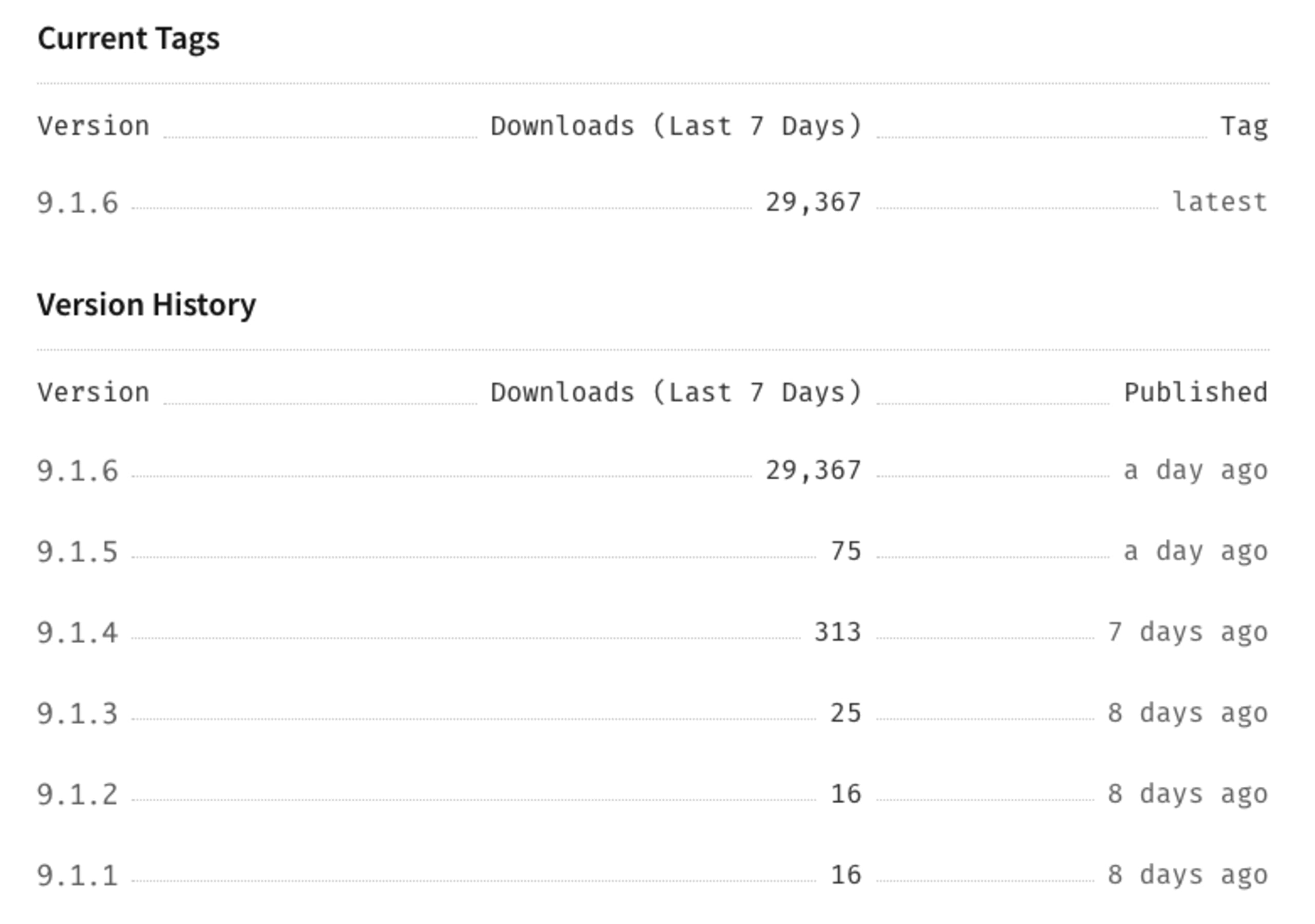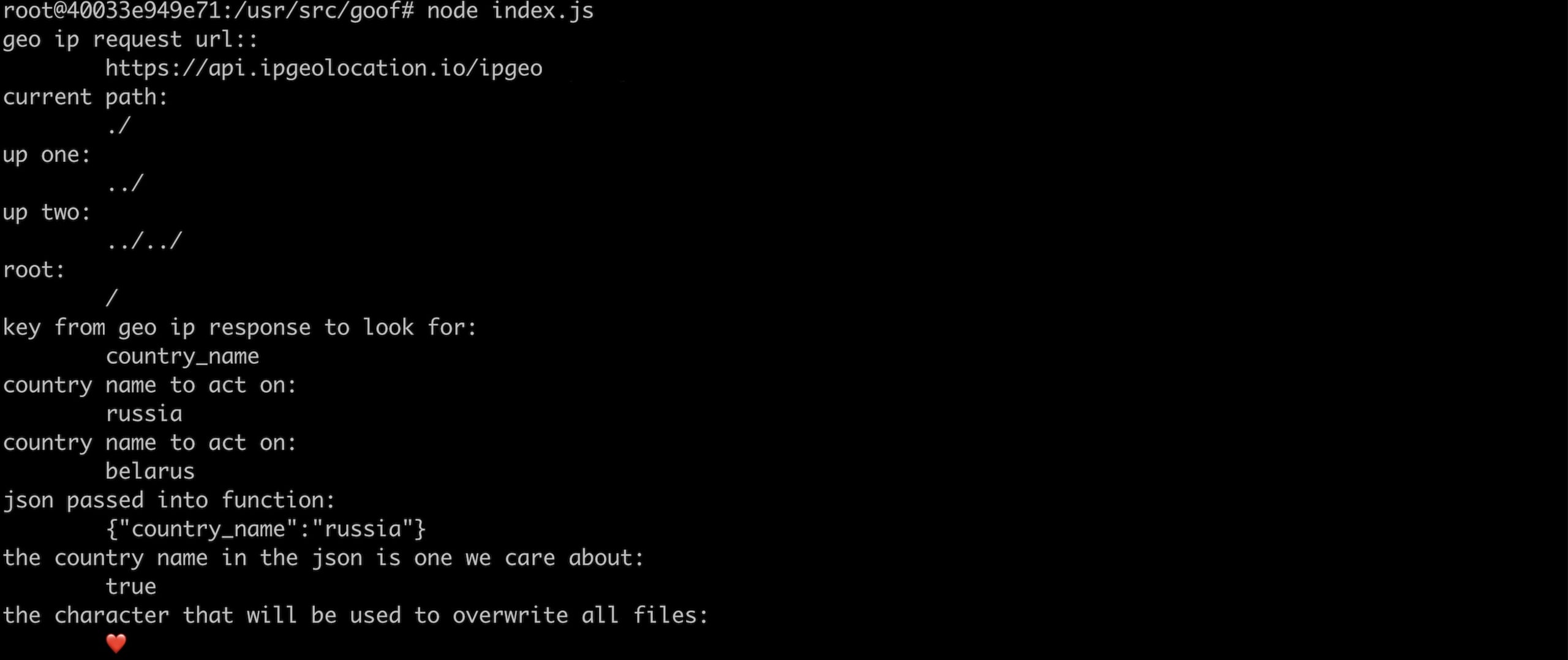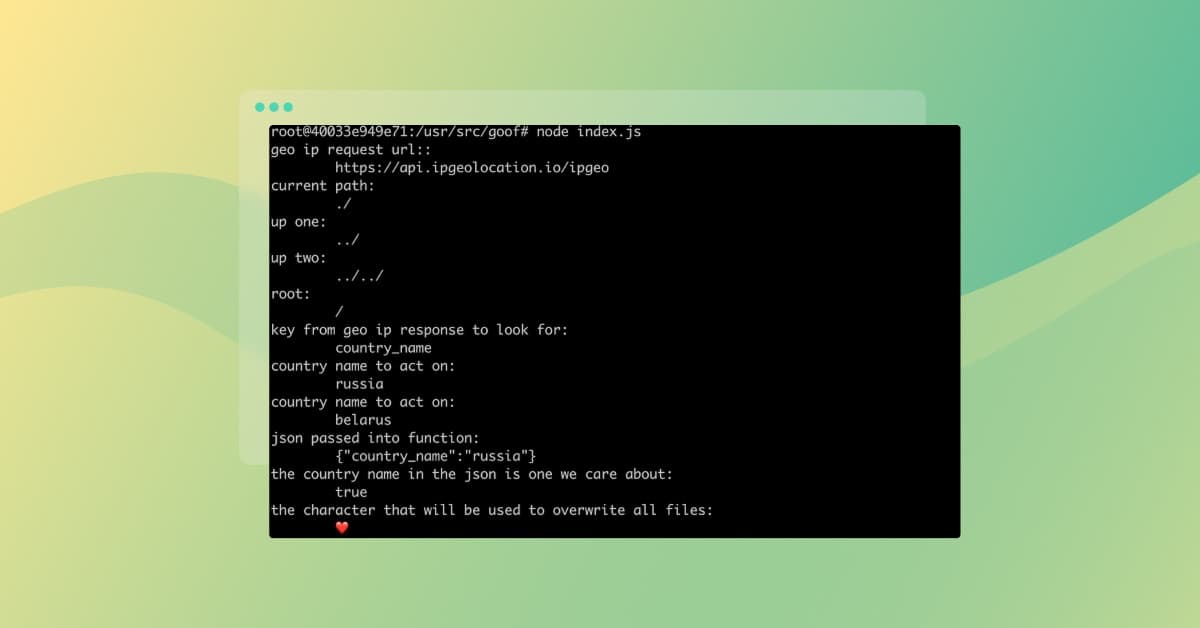Alert: peacenotwar module sabotages npm developers in the node-ipc package to protest the invasion of Ukraine
16 mars 2022
0 minutes de lectureOn March 15, 2022, users of the popular Vue.js frontend JavaScript framework started experiencing what can only be described as a supply chain attack impacting the npm ecosystem. This was the result of the nested dependencies node-ipc and peacenotwar being sabotaged as an act of protest by the maintainer of the node-ipc package.
This security incident involves destructive acts of corrupting files on disk by one maintainer and their attempts to hide and restate that deliberate sabotage in different forms. While this is an attack with protest-driven motivations, it highlights a larger issue facing the software supply chain: the transitive dependencies in your code can have a huge impact on your security.
Snyk is tracking the security incidents that are portrayed in this article via the following CVEs: CVE-2022-23812 for node-ipc and SNYK-JS-PEACENOTWAR-2426724 for peacenotwar and oneday-test npm modules. If you are already using Snyk for open source security and supply chain security, you will be getting notifications, alerts, and automated pull requests raised by the tooling to keep you safe and informed on the matter. To learn more about the details of this supply chain attack, keep reading.
Prior events leading to the abuse of npm package node-ipc
This story started on March 8, 2022, at 6PM GMT+2, at which time, npm maintainer RIAEvangelist (Brandon Nozaki Miller) wrote source code and published an npm package called peacenotwar, which per their description for this module:
Up until yesterday (March 15), this module had virtually no downloads at all. However that all changed when its npm maintainer added this module as a dependency to one of their other popular modules node-ipc, which is by itself a popular dependency that many JavaScript developers in the ecosystem are relying upon.

One of those JavaScript ecosystem projects is Vue.js’s command line tool, the Vue.js CLI, also known as npm package @vue/cli. The following nested dependency tree shows exactly how node-ipc trickles into the Vue.js CLI npm package and further promotes the need to vet nested dependencies as a holistic risk:
The current latest “stable” version of npm package node-ipc (version 9.2.2) bundles peacenotwar and also, interestingly enough, it bundles the infamous colors npm package with a wildcard * dependency range. If you haven’t heard the story of the npm package colors, and faker being intentionally abused and corrupted by its npm package maintainer Marak, I highly suggest following up on that as another perspective of open source supply chain security.
Timeline of events
Prior versions of node-ipc, such as 10.1.0 (released six months ago) and up until 10.0.0 (released nine months ago), have all had genuine updates and improvements added into them. However…
March 7
Last week, version 10.1.1 was published with clear code updates that raised concerns for suspicious activity and potential abuse of the source code and the package’s behavior. Let’s explore the difference between version 10.1.0 and 10.1.1:
The node-ipc.cjs CommonJS compatible Node.js module is quite long, at more than 1000 lines of code. The existence of outbound HTTPS calls to remote locations, and Base64-encoded data in it are a good enough reason to alert for possible wrong-doings here, and serve as a base for IoCs (indications of compromise).
This code that has been added to node-ipc@10.1.1 sets a timer, so that on every pre-configured random interval, of which a node-ipc related code is being called, it also executes a function, to what seems to be, making file system operations.
Let’s take a closer look at the Base64-encoded values of the arguments passed to the function which executes filesystem operations. From the above diff:
All of these are then passed to the timer function, such as:
The values for the above encoded Base64 strings are:
n2is set to:./o2is set to:../ris set to:../../fis set to:/
When these are passed to the timer function, they are then being used in the following line of code as sources of file inputs to wipe the file contents and replace it with a heart emoji (depicted via diff line + const c = Buffer.from("4p2k77iP", "base64");)
At this point, a very clear abuse and a critical supply chain security incident will occur for any system on which this npm package will be called upon, if that matches a geo-location of either Russia or Belarus.

The updated contents of the README file for node-ipc@10.1.1does not call out this newly added behavior. It instead includes a call to sponsor RIAEvangelist and an example of how to use ES6 and CommonJS version of node-ipc in versions 10 and up.
About ten hours later, version node-ipc@10.1.2 was released, with nearly no change except for a version bump. Potentially, trying to trigger automated dependency upgrades. Here is the full git diff between the two versions:
March 8
Then, roughly five hours after that, on March 8, a new release is pushed: node-ipc@10.1.3, which seems to have removed all indications of the aforementioned destructive payload. Examining the git diff between the two versions confirms:
We suspect that this had been rolled out of the 10.x version branch due to a conversation stemming from the GitHub issue that reported this behavior, in which the maintainer claims that they have published that payload as part of a new major version of the library:

So, at this point, we can summarize that the vulnerable versions of node-ipc being node-ipc@10.1.1 and node-ipc@10.1.2 have existed on the npmjs registry for less than 24 hours, yet due to the high downloads count across developers and build systems, this has definitely impacted some of them, as we have confirmed being reported on public repositories:

However, vulnerable versions 10.1.1 and 10.1.2 no longer exist on the npmjs registry, and have actually been flagged deprecated, either by the maintainer or by the npmjs team. We can confirm that from the following npmjs website notice:

On March 8, at 7:25PM GMT+2 and less than four hours after node-ipc@10.1.3 had been published to roll back the destructive payload, a new major version node-ipc@11.0.0 was released on the npmjs registry. What changed?
New node-ipc@11.0.0 major version now includes the following:
A dependency on
peacenotwarmoduleAny time the
node-ipcmodule functionality gets called, it prints to STDOUT a message taken out of thepeacenotwarmodule, as well as places a file on the user’s Desktop directory with contents relating to the current war-time situation of Russia and Ukraine.The README for 11.0.0 communicates the explicit usage of
peacenotwaras part of this module in the following note:***as of v11*** this module uses the [peacenotwar](https://github.com/RIAEvangelist/peacenotwar) module.
What lead to npm packagepeacenotwar put into mainline node-ipc versions impacting millions of developers?
March 15
Yesterday, on March 15, at 6:49PM GMT+2 and 7:40PM GMT+2, two new significant and impactful npm versions were published for node-ipc. Most significant of these is a new patch version node-ipc@9.2.2 due to the fact it is the latest stable branch of node-ipc and many ecosystem projects rely on it, including the aforementioned @vue/cli Vue.js CLI.
Following are the changes added in node-ipc@9.2.2:
It adds some example source code into the package contents.
It adds
peacenotwaras a dependency, and runs it whennode-ipcis being called by any dependencies that import it.It also explicitly adds a dependency on
colors@*which pulls in intentionally vulnerable source code by another maintainer.It changes the license in this new minor version from MIT license to DBAD license Editor’s note: TheDBADlicense contains coarse language.
At around the same time, a new minor version was released: node-ipc@11.1.0 which bumps the peacenotwar dependency to a new version, but removes the console.log() STDOUT messages that were logged. We can confirm in the following git diff log between the two npm packages of node-ipc:
Supply chain security in the face of maintainer reputation
Even if the deliberate and dangerous act of maintainer RIAEvangelist will be perceived by some as a legitimate act of protest. How does that reflect on the maintainer’s future reputation and stake in the developer community? Would this maintainer ever be trusted again to not follow up on future acts in such or even more aggressive actions for any projects they participate in?
Currently, RIAEvangelist maintains over 40 other npm packages with hundreds of millions of downloads behind them. Here are just a few of the modules they maintain and their weekly downloads on the npmjs registry:
npm Module | Weekly downloads |
|---|---|
node-ipc — A nodejs module for local and remote Inter Process Communication (IPC), Neural Networking, and able to facilitate machine learning. | 1,055,386 |
js-queue — Simple JS queue with auto run for node and browsers. | 1,042,512 |
easy-stack — Simple JS stack with auto run for node and browsers. | 1,001,945 |
js-message — Normalized JS Object and JSON message and event protocol for node.js, vanialla js, react.js, components, actions, stores and dispatchers. | 1,001,943 |
event-pubsub — Super light and fast Extensible ES6+ events and EventEmitters for Node and the browser. Easy for any developer level, use the same exact code in node and the browser. No frills, just high speed events! | 996,076 |
node-cmd — Simple commandline/terminal/shell interface to allow you to run cli or bash style commands as if you were in the terminal. | 41,083 |
The Snyk Security Research team hasn’t found any indications of other packages by this maintainer having any intentional abuse like this, but remains vigilant to updates published to the npmjs ecosystem.
How to mitigate the node-ipc issue
With concerns about future code updates that may put users at risk, we recommend avoiding the node-ipc npm package entirely. If this npm package is bundled in your project as part of the application you are building, then we recommend that you use the npm package managers feature to override the sabotaged versions altogether and pin down the transitive dependency to known good.
If you are using npm as the package manager, you can add the following to your package.json file to explicitly allow only benign versions of node-ipc:
Known high-profile victims of the node-ipc incident
Vue.js project found vulnerable to node-ipc’s protestware
The Vue.js CLI used to depend on node-ipc's 9.x version range and was vulnerable to the 9.2.2 version which added the peacenotwar module that would write a WITH-LOVE-FROM-AMERICA.txt file on the user’s desktop directory. The vulnerability in @vue/cli has since been fixed. Please update to the latest versions of @vue/cli, either 4.5.16+ or 5.0.3+ using your package manager of choice:
Unity game engine found vulnerable to node-ipc’s protestware
Users have reported that the Unity game engine project was found to be distributing its software along with node-ipc@9.2.2 which was alarming to users who surprisingly found a new file created on their desktop. The Unity team rushed to release a hotfix 3.1.1 version on March 16th to mitigate the issue.
Summary
Snyk stands with Ukraine and we've proactively acted to support the Ukrainian people during the on-going crisis with donations and free service to developers world-wide, as well as taking action to cease business in Russia and Belarus. That said, intentional abuse such as this undermines the global open source community and requires us to flag impacted versions of node-ipc as security vulnerabilities.
As such, the Snyk security team published CVE-2022-23812 and SNYK-JS-PEACENOTWAR-2426724 to alert and track the security vulnerability with the intentional vulnerable versions of node-ipc. Snyk’s free plan is also up to date with this new vulnerability, which enables developers to scan, monitor, and automatically deploy security fixes in the form of pull requests.
Nevertheless, the impact of supply chain security incidents continues to demonstrate the need to properly manage and react swiftly to the risks with open source dependencies. Furthermore, the complexity of nested dependencies, such as on the npmjs JavaScript ecosystem has once again proven the compounding impact that they have across key ecosystem projects.
Only two months ago we covered the widespread fallout of a similar security incident in which an open source maintainer pulled the plug on npm packages ‘colors’ and ‘faker’, showcasing the ability for maintainers to intentionally sabotage open source libraries..
Gaining skills in how to manage software dependencies at scale is becoming evidently more important, as well as ensuring that you as a developer are following npm security best practices, and learning about security pitfalls and incidents such as why npm lockfiles can be a security blindspot for injecting malicious modules.
Learn more about supply chain security with these blogs:
